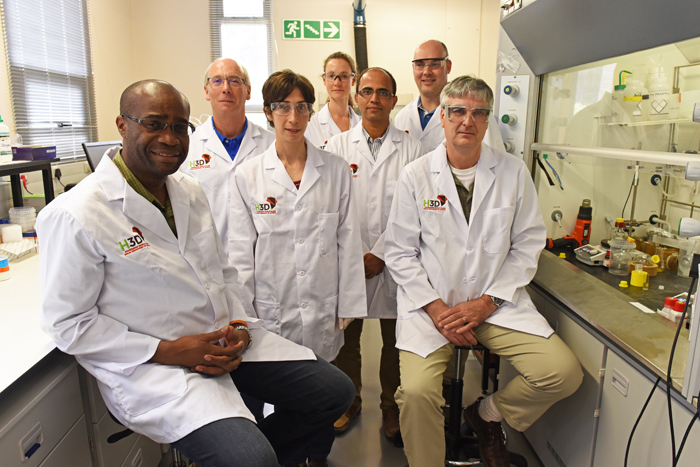UCT's biotech lab takes drug discovery to new level
11 December 2015 | Story by Newsroom
The recent launch of H3D's state-of-the-art, R22 million medicinal chemistry laboratory marks a new chapter in the university's drug discovery programme.
Launched under the umbrella of UCT's Drug Discovery and Development Centre's (H3D), the new laboratory underscores the Western Cape's reputation as the biotech hub of Africa.
H3D was founded in 2011 to create a discovery and development platform for new drugs and is Africa's first fully integrated modern drug discovery and development centre. In 2012 the first compound was approved by Medicines for Malaria Venture (MMV) as a preclinical, anti-malarial development candidate. It has now completed Phase I human trials.
H3D has also boosted its scientific staff in the areas of medicinal chemistry, biology, drug metabolism and pharmacokinetics. The team now includes five top scientists from the biotech industry and pharmaceutical companies AstraZeneca and Merck. Between them they have a combined 110 years of biotech and pharmaceutical industry drug discovery experience.
This means the centre now has the integrated skills and infrastructure comparable to a biotech or pharmaceutical company needed to produce new drug candidates for life-threatening diseases, says H3D founder and director, Professor Kelly Chibale (chemistry department).
Chibale spent his 2008 sabbatical at the pharmaceutical company Pfizer in the UK learning about drug discovery.
“I learnt that it requires dedicated teams with integrated skills and know-how,” he explained.
The new laboratory will fast-track drug discovery by establishing platforms that allow a “kill quick, kill cheap” approach if a project is not working.
Drug discovery to expand
The new laboratories were designed with help from industry partners Novartis, through the Novartis Institutes for BioMedical Research (NIBR), and are modelled on similar laboratories at the NIBR in the US. Financial support comes from the Novartis Research Foundation in Switzerland, the Wolfson Foundation in the UK, the Garfield Weston Foundation in the UK and UCT.
“UCT has a very attractive translational medicine environment because not only do we have world-class laboratory-based basic science but we can also do drug discovery that integrates forward into the clinic, and vice versa, from the clinic into laboratory-based basic science,” said Chibale.
“This allows us to operate like a pharmaceutical company but embedded within the university environment. We now have key underpinning infrastructure, expertise and technologies that can be applied broadly to any disease area. And depending on the disease we will bring in disease biology and clinical expertise to augment and complement our generic medicinal chemistry, drug metabolism and pharmacokinetics platforms.”
The new laboratory means H3D can also expand its current work in malaria and tuberculosis into areas such as helminths (parasitic worms exemplified by schistosomiasis), cancer, cardiovascular disease and fibrosis. This underpins UCT's drive to develop African science.
Merck research agreement
Just one week after the launch, H3D (through UCT) and pharmaceutical giant Merck signed a research agreement to co-develop a new research and development platform to identify new lead programmes for potential treatments against malaria, with the potential to expand to other tropical diseases.
“UCT's H3D is a centre of excellence for research and innovation with an already strong track record in malaria drug discovery – we are honoured to be entering into a collaboration with this renowned institution,” says Beatrice Greco, Head of Malaria and Diagnostics – Global Health R&D, within the biopharmaceutical business of Merck.
Chibale adds: “Working with partners like Merck is critical to build up a comprehensive pipeline to tackle malaria and related infectious diseases. We look forward to working with the Merck team to set up a solid drug discovery platform, with an initial focus on malaria.”
Innovation vital to Africa
Innovation is vital to the country's future, says Chibale.
South Africa is ranked among the underperforming countries on the Global Innovation Index (GII).
By comparison, Switzerland (with a population of only eight million people and a per capita gross domestic product of US$45 285) leads the GII. Its secret is a close relationship between university and industry research collaboration.
“There's a difference between invention and innovation. Innovation is vital. It looks at what industry needs, what is viable in the market place and what is possible with technology. The power of innovation is translating basic knowledge into a product like a life-saving medication.”
Chibale also has an eye on the new Cape Health Technology Park (CHTP), which is in the process of being developed in Pinelands and is aimed at enabling and supporting health technology innovation in the Western Cape.
Chibale discussed the topic ('Cape Town: Africa's Pharma R&D and Healthtech Hub?') at the recent Thought Leaders' breakfast where he was one of three guest speakers. This was organised by Accelerate Cape Town and sponsored by Price Waterhouse Coopers.
“The idea is to migrate and locate ourselves in the CHTP, to make the province Africa's prime biotech hub.”
Story by Helen Swingler. Photo by Michael Hammond.
 This work is licensed under a Creative Commons Attribution-NoDerivatives 4.0 International License.
This work is licensed under a Creative Commons Attribution-NoDerivatives 4.0 International License.
Please view the republishing articles page for more information.










